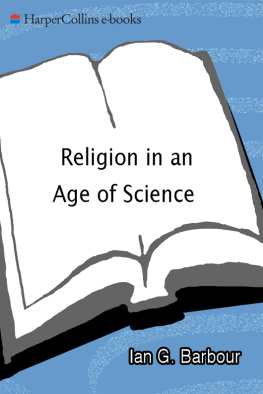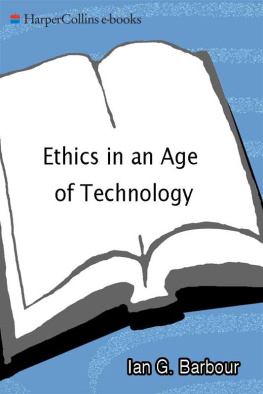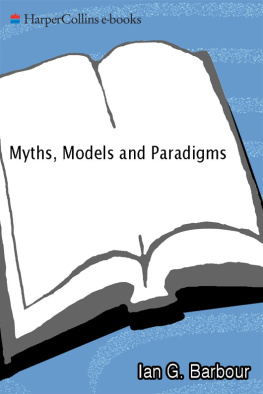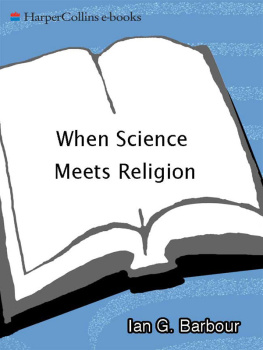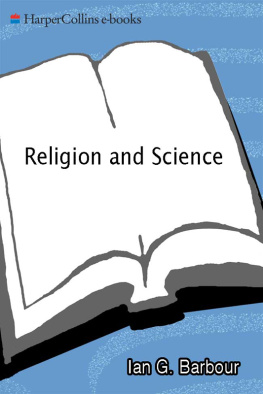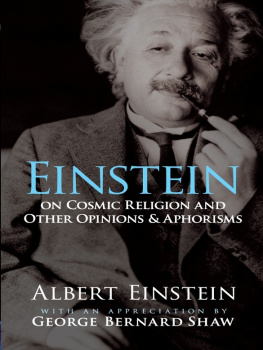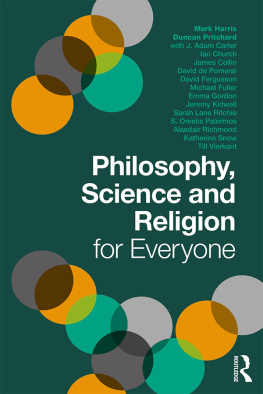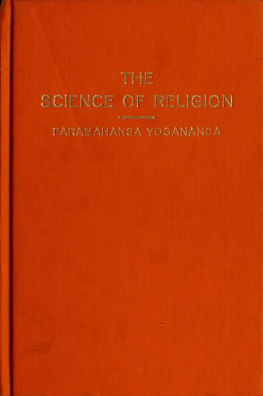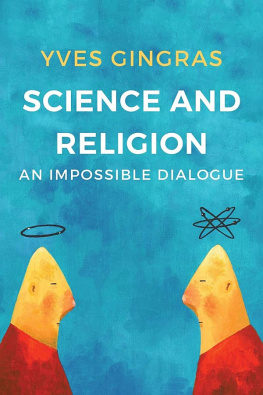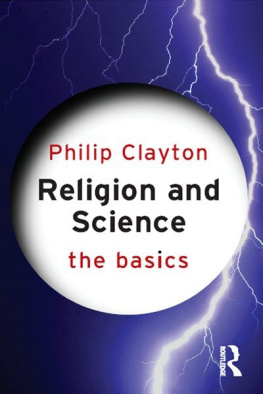Ian G. Barbour - Religion in an Age of Science
Here you can read online Ian G. Barbour - Religion in an Age of Science full text of the book (entire story) in english for free. Download pdf and epub, get meaning, cover and reviews about this ebook. year: 1990, publisher: Harpercollins (Short Disc), genre: Religion. Description of the work, (preface) as well as reviews are available. Best literature library LitArk.com created for fans of good reading and offers a wide selection of genres:
Romance novel
Science fiction
Adventure
Detective
Science
History
Home and family
Prose
Art
Politics
Computer
Non-fiction
Religion
Business
Children
Humor
Choose a favorite category and find really read worthwhile books. Enjoy immersion in the world of imagination, feel the emotions of the characters or learn something new for yourself, make an fascinating discovery.
- Book:Religion in an Age of Science
- Author:
- Publisher:Harpercollins (Short Disc)
- Genre:
- Year:1990
- Rating:3 / 5
- Favourites:Add to favourites
- Your mark:
- 60
- 1
- 2
- 3
- 4
- 5
Religion in an Age of Science: summary, description and annotation
We offer to read an annotation, description, summary or preface (depends on what the author of the book "Religion in an Age of Science" wrote himself). If you haven't found the necessary information about the book — write in the comments, we will try to find it.
Religion in an Age of Science — read online for free the complete book (whole text) full work
Below is the text of the book, divided by pages. System saving the place of the last page read, allows you to conveniently read the book "Religion in an Age of Science" online for free, without having to search again every time where you left off. Put a bookmark, and you can go to the page where you finished reading at any time.
Font size:
Interval:
Bookmark:

THE GIFFORD LECTURES
ABERDEEN, SCOTLAND
First Series, 198990
RELIGION IN AN AGE OF SCIENCE
Second Series, 199091
ETHICS IN AN AGE OF TECHNOLOGY
Unless otherwise noted, all scriptural quotations are from the Revised Standard Version, 1946 and 1952 by the Division of Christian Education of the National Council of Churches of Christ in the U.S.A.
R ELIGION IN AN AGE OF SCIENCE: The Gifford Lectures, 19891991, Volume 1. Copyright 1990 by Ian G. Barbour. All rights reserved under International and Pan-American Copyright Conventions. By payment of the required fees, you have been granted the nonexclusive, nontransferable right to access and read the text of this e-book on-screen. No part of this text may be reproduced, transmitted, downloaded, decompiled, reverse-engineered, or stored in or introduced into any information storage and retrieval system, in any form or by any means, whether electronic or mechanical, now known or hereinafter invented, without the express written permission of HarperCollins e-books.
Library of Congress Cataloging-in-Publication Data
Barbour, Ian G.
Religion in an age of science / Ian G. Barbour.1st ed.
p. cm.(The Gifford lectures: 19891991, v. 1)
Includes bibliographical references.
ISBN 006-0603836 1.
EPub Edition April 2013 ISBN 9780062287243
Religion and science1946 I. Title. II. Series: Gifford lectures: 19891990.
BL240.2.B368 1990 | |
291.17 5--dc20 | 8945552 |
CIP |
94 RRD(H) 10 9 8 7 6
To my brothers
Hugh Stewart Barbour
and
Robert Freeland Barbour (19261953)
I am grateful to Lord Gifford who established in his will of 1885 the lectureship that bears his name. This volume is based on my first series of lectures at the University of Aberdeen during the autumn term in 1989. The second series is to be given a year later.
The months in Scotland were a kind of homecoming for me. My grandfather was a physician in Edinburgh, which was my fathers home until he went as a geologist to China, and later to America. More recently, my oldest son was a student for a year at the University of Aberdeen. He told us to bring warm clothes with us. Someone had said to him: Yell know its cold when the weather r-r-rusts your molars. But after temperatures of thirty-four degrees below zero in Minnesota, Aberdeen was warm by comparison. And my wife and I received a truly warm welcome from the University of Aberdeen, particularly from the faculties of theology, philosophy, and physics.
I began work on these lectures several years ago during a term at the Center for Theology and the Natural Sciences (CTNS) in the Graduate Theological Union at Berkeley, California. Both at the time and in subsequent years I have greatly appreciated interaction with the groups of faculty, graduate students, and visiting scholars who have met under the auspices of CTNS and its director, Robert Russell.
I am deeply indebted to Arthur Peacocke, Holmes Rolston, Robert Russell, and my wife, Deane Barbour, for their insightful comments on an earlier draft of the manuscript. Valuable suggestions on particular chapters came from John Barbour, Mary Gerhart, David Griffin, Philip Hefner, Eric Juengst, Nancey Murphy, John Polkinghorne, and David Wilcox. I am grateful for Scott Oneys assistance in revising the text on my word processor and to Priscilla Stuckey-Kauffman for careful copyediting of the manuscript.
An earlier version of chapter 1 was published in Physics, Philosophy, and Theology: A Common Quest for Understanding, edited by Robert John Russell, William R. Stoeger, S.J., and George V. Coyne, S.J. (The Vatican: Vatican Observatory, and Notre Dame: University of Notre Dame Press, 1988). A shorter rendition of chapter 5 was included in Cosmos As Creation: Science and Theology in Consonance, Ted Peters, editor (Nashville: Abingdon Press, 1989.) They appear here by prior agreement with the respective editors.
CARLETON COLLEGE
NORTHFIELD, MINNESOTA
What is the place of religion in an age of science? How can one believe in God today? What view of God is consistent with the scientific understanding of the world? In what ways should our ideas about human nature be affected by the findings of contemporary science? How can the search for meaning and purpose in life be fulfilled in the kind of world disclosed by science?
A religious tradition is not just a set of intellectual beliefs or abstract ideas. It is a way of life for its members. Every religious community has its distinctive forms of individual experience, communal ritual, and ethical concerns. Above all, religion aims at the transformation of personal life, particularly by liberation from self-centeredness through commitment to a more inclusive center of devotion. Yet each of these patterns of life and practice presupposes a structure of shared beliefs. When the credibility of central religious beliefs is questioned, other aspects of religion are also challenged.
For many centuries in the West, the Christian story of creation and salvation provided a cosmic setting in which individual life had significance. It allowed people to come to terms with guilt, finitude, and death. It provided a total way of life, and it encouraged personal transformation and reorientation. Since the Enlightenment, the Christian story has had diminishing effectiveness for many people, partly because it has seemed inconsistent with the understanding of the world in modern science. Similar changes have been occurring in other cultures.
Much of humanity has turned to science-based technology as a source of fulfillment and hope. Technology has offered power, control, and the prospect of overcoming our helplessness and dependency. However, for all its benefits, technology has not brought the personal fulfillment or social well-being it promised. Indeed, it often seems to be a power beyond our control, threatening nuclear holocaust and environmental destruction on a scale previously unimaginable.
Five features of our scientific age set the agenda for this volume:
1. The Success of the Methods of Science. The impressive achievements of science are widely known. Scientific research has yielded knowledge of many previously inaccessible domains of nature. The validity of such discoveries receives additional confirmation from the fact that they have led to powerful new technologies. For some people, science seems to be the only reliable path to knowledge. For them, the credibility of religious beliefs has been undermined by the methods as well as by the particular discoveries of science. Other people assert that religion has its own distinctive ways of knowing, quite different from those of science. Yet even they are asked to show how religious understanding can be reliable if it differs from scientific knowledge. Science as a method constitutes the first challenge to religion in a scientific age. It is the topic of part 1.
2. A New View of Nature. Many of the sciences show us domains of nature with characteristics radically different from those assumed in previous centuries. What are the implications of the novel features of quantum physics and relativity, such as the indeterminancy of subatomic events and the involvement of the observer in the process of observation? What is the theological significance of the Big Bang, the initial explosion that started the expansion of the universe 15 billion years ago, according to current theories in astrophysics? How are the scientific accounts of cosmic beginnings and biological evolution related to the doctrine of creation in Christianity? Darwin portrayed the long, slow development of new species, including the human species, from the operation of random variations and natural selection. More recently, molecular biologists have made spectacular discoveries concerning the role of DNA in evolution and in the development and functioning of organisms today. What do these discoveries tell us about the nature of life and mind? Such questions are explored in part 2.
Next pageFont size:
Interval:
Bookmark:
Similar books «Religion in an Age of Science»
Look at similar books to Religion in an Age of Science. We have selected literature similar in name and meaning in the hope of providing readers with more options to find new, interesting, not yet read works.
Discussion, reviews of the book Religion in an Age of Science and just readers' own opinions. Leave your comments, write what you think about the work, its meaning or the main characters. Specify what exactly you liked and what you didn't like, and why you think so.

